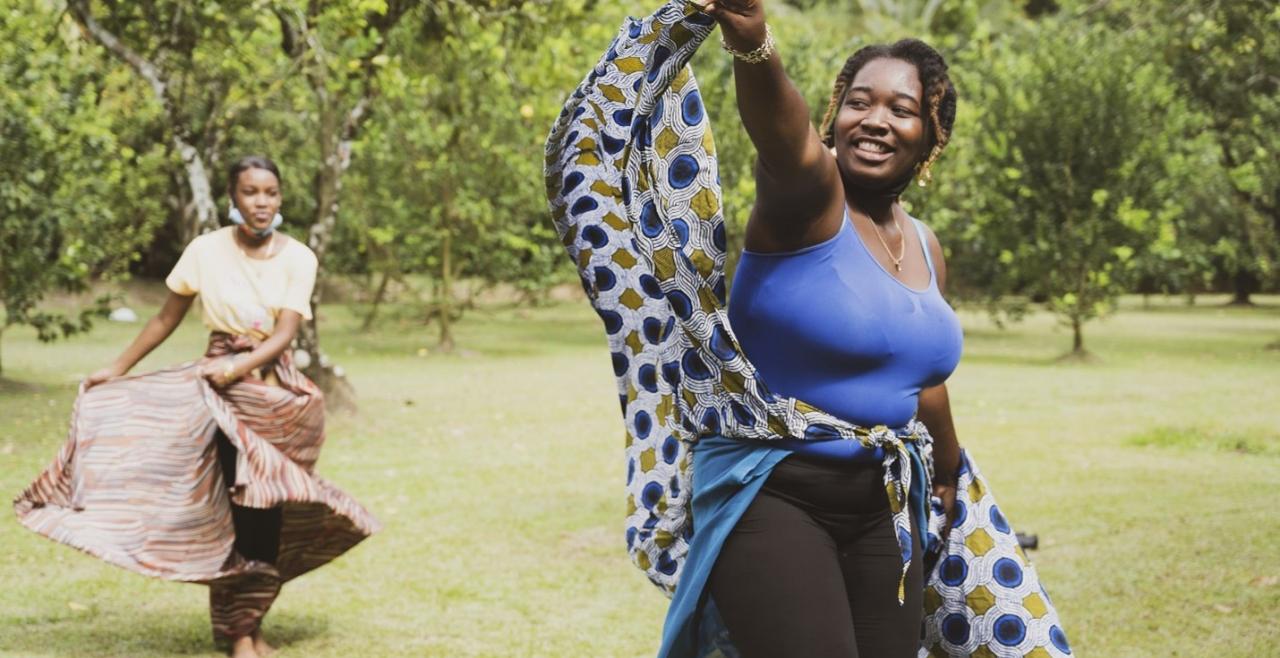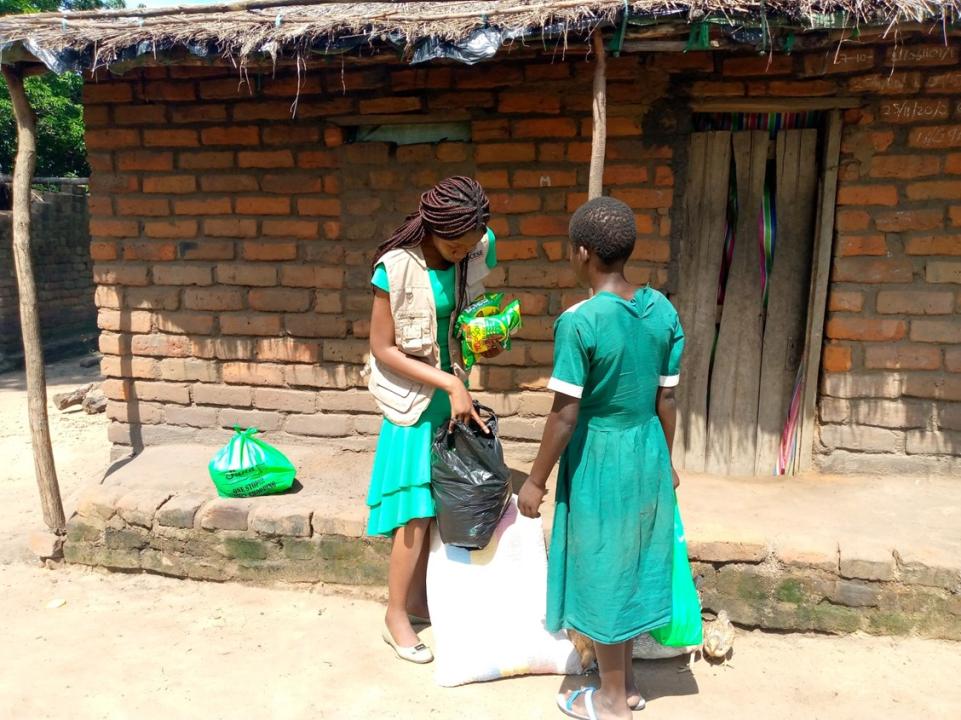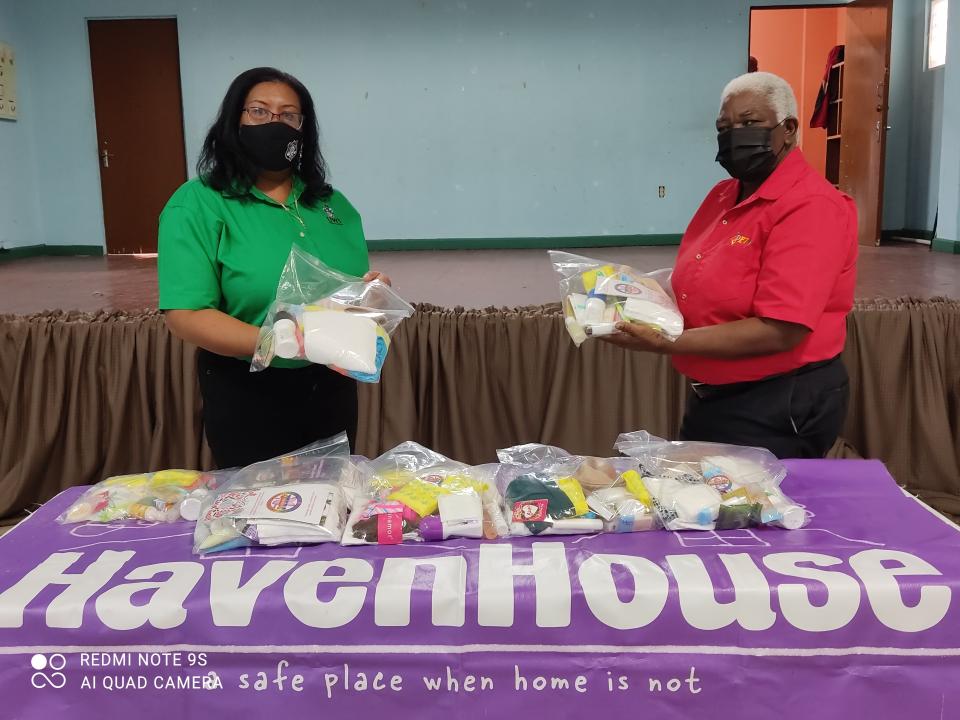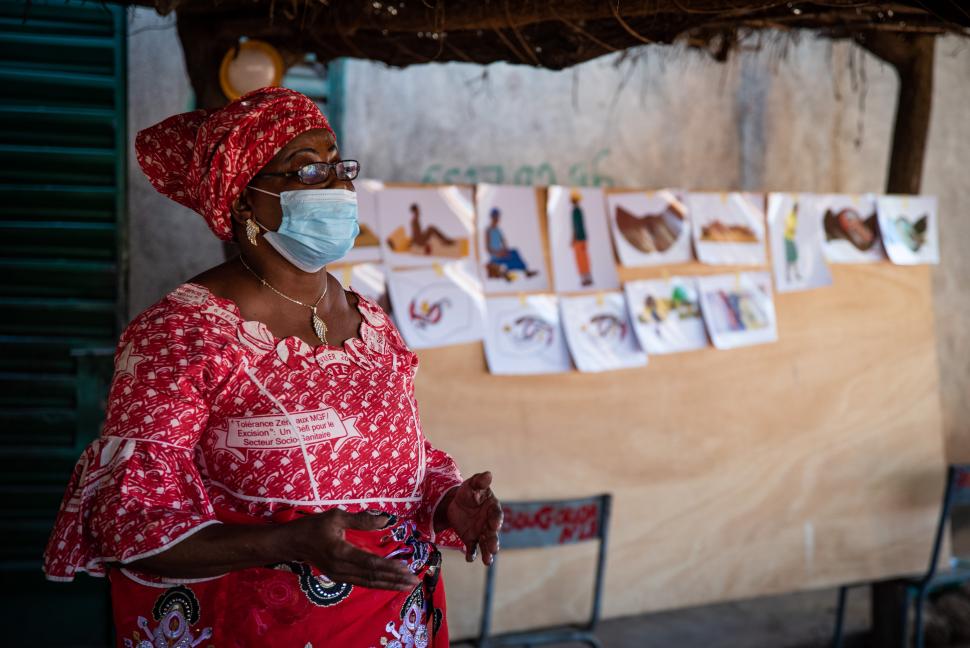Stand With Her: 6 women-led organizations tackling gender-based violence

To help communities around the world take on gender-based violence, the UN Foundation teamed up with the Spotlight Initiative to create the WithHer Fund. From supporting Deaf women in Argentina to ending child marriage in Mali, the six organizations that comprise the inaugural cohort of grantees are proving that local organizations led by women are best suited to support survivors and challenge harmful social norms in their communities.
Gender-based violence (GBV) is a global public health emergency that has plagued girls and women throughout history. Defined as harmful acts directed at an individual based on their gender, GBV is a constant threat for girls and women around the world regardless of their age, race, or socioeconomic status. And they are at risk everywhere and anywhere — at work, at school, and at home.
This kind of targeted violence is rooted in systemic gender inequality and can be physical, sexual, economic, or psychological. It can look like a child undergoing female genital mutilation, a student assaulted in her dorm, or a stay-at-home mom restricted from accessing financial resources.
The statistics on GBV are bleak. The United Nations Office for the Coordination of Humanitarian Affairs estimates that 1 in 3 women worldwide will experience physical or sexual abuse in her lifetime. In 2020, the UN Office on Drugs and Crime found that, on average, a girl or woman is killed by someone in her own family every 11 minutes.
While GBV remains a universal plague for girls and women, their collective power to help one another and overcome cannot be overlooked.
GIRLS AND WOMEN ARE RESILIENT
In every corner of the world, groups led by women are organizing, listening to, and supporting survivors of GBV while tackling gender inequality in their own communities.
And in most cases, they’re doing so with extremely limited resources. Because most grassroots organizations rely on volunteers and project-based funding, operational costs are rarely covered by donations or grants. This financial uncertainty ultimately endangers the sustainability and impact of this vital, lifesaving work. A recent report on global philanthropy and feminist movements found that only 1% of gender-focused international aid was directed to women’s rights organizations. Further, most women’s rights organizations have never received unrestricted or multiyear funding.
To address this dismal gap, the United Nations Foundation joined forces with the EU-led Spotlight Initiative to launch the WithHer Fund. A new funding vehicle, the WithHer Fund provides flexible grants to local, women-led organizations working to end GBV.
Meet the inaugural cohort of WithHer Fund grantees, from Argentina to Mali, that are challenging harmful social norms and creating spaces for GBV survivors to heal and access the resources they need and deserve.
SORDAS SIN VIOLENCIA (DEAF WOMEN WITHOUT VIOLENCE)
ARGENTINA
Sordas Sin Violencia (Deaf Women Without Violence) is a program co-led by Deaf and hearing women to provide assistance, emotional support, and access to resources for GBV survivors in the Deaf community across Argentina. Sabrina Grinschpun is a Deaf linguistic-intercultural mediator at Sordas Sin Violencia, which was founded by Ester Mancera, a trained psychologist with years of experience providing support to women in situations of high vulnerability.
As a Deaf woman, Sabrina understands more than most the barriers that GBV survivors in the Deaf community face in accessing support services.
“How can we ask for help, get advice, or ask for judicial intervention if there are no interpreting teams in Argentine Sign Language in public services? How can we learn about [GBV] if the campaigns for the prevention of violence and comprehensive sexual education are not specifically designed by and for the Deaf community?” said Sabrina Grinschpun, Deaf linguistic-intercultural mediator for Sordas Sin Violencia.
At Sordas Sin Violencia, Deaf mediators, LSA-Spanish interpreters, and hearing professionals form local assistance teams across Argentina’s provinces to support survivors with everything from filing a complaint to testifying in court and finding health services. Through this outreach, Sordas Sin Violencia upholds the international Convention on the Rights of Persons with Disabilities.
FOUNDATION FOR CIVIC EDUCATION AND SOCIAL EMPOWERMENT
MALAWI
The Foundation for Civic Education and Social Empowerment (FOCESE) is an advocacy organization run by young women that is focused on raising awareness about GBV and sexual and reproductive health and rights (SRHR) among youths in Malawi’s Balaka District. Though just 30 years old, Christie Banda serves as the Executive Director of the organization and brings a deep understanding of the community, having lived there throughout her life.
“Poverty in our communities is extreme, severe, and chronic. Most of the women have nothing to do to support their lives and as such they are easily abused by their husbands. … FOCESE undertakes various interventions aimed at creating a cadre of adolescent girls and women with knowledge and assertive skills who can ably negotiate and challenge the harmful practices that fuel GBV,” said Christie Banda, Executive Director of FOCESE.
Among its many activities, FOCESE uses sport, song, and drama to challenge internalized sexism, build confidence and self-determination among girls, create positive social bonds within the community, and provide a platform for discussing SRHR and GBV. Since November 2021, the sporting project alone has reached more than 750 girls and 1,200 community members. Since providing awareness-raising activities, FOCESE has experienced an increase in demand for SRHR services, including voluntary family planning and post-abortion and GBV support by adolescent girls, young women, and marginalized communities.
“I come from a strong line of women who supported each other. I believe that it is my responsibility to carry this legacy on." - NiNa Founder Akosua Dardaine Edwards
NINA YOUNG WOMEN’S LEADERSHIP PROGRAMME
TRINIDAD & TOBAGO
NiNa Young Women’s Leadership Programme supports young women who are transitioning from state care into independent living. A recent report commissioned by the Government of Trinidad and Tobago found that children in state-run facilities experience high levels of abuse and violence. Upon leaving state care, young women are more vulnerable to falling into abusive relationships or homelessness.
Akosua Dardaine Edwards, a gender and entrepreneurship specialist, created the NiNa programme to provide young vulnerable women with entrepreneurial, leadership, and confidence-building skills.
“I come from a strong line of women who supported each other. I believe that it is my responsibility to carry this legacy on. Young women [leaving state care] have dreams, ambitions, and visions for themselves. Our role is to be an incubator for that, to shine a light on the possibilities with love and in service,” said Akosua Dardaine Edwards, Founder and National Coordinator of NiNa Young Women’s Leadership Programme.
Led by certified coaches, NiNa’s workshops holistically address critical themes in girls’ lives, including spirituality, relationships, sexuality, and safety. Half of all young women who participate have experienced GBV, including sexual trauma. Through outdoor movement-based workshops, NiNa aims to empower and support participants as they reclaim ownership of their bodies and reconnect with the healing power of nature.
HAVEN HOUSE
BELIZE
Haven House President Dr. Sharmayne Saunders and a Board Member of PETAL (Promoting Empowerment Through Awareness for Les/Bi Women) with hygiene packages for shelter participants. Photo: Haven House
For over 20 years, Haven House has provided shelter and support services for approximately 1,200 female survivors of GBV and their children in Belize. The current President of Haven House, Sharmayne Saunders, grew up in the community she now serves — a community where GBV often remains a family secret and many cases go unreported. A 2020 report found that women make up 84% of domestic violence victims in Belize; the majority of these incidents occur within the home of either the victim or the perpetrator.
“We have the flexibility to act fast in emergency situations, which sometimes [is the difference] between us providing much-needed aid to a woman or her returning to the perpetrator. … This is only possible through the flexibility of the program to quickly transition the family to independent living, rather than waiting for a system which would normally take months to receive approval,” said Sharmayne Saunders, Haven House President.
Haven House offers rental assistance, grocery coupons, and medical care to women, as well as job skills training in crafts, sewing, and culinary arts. By providing a safe shelter, Haven House gives women an opportunity to rebuild their lives.
CEMUJER
EL SALVADOR
CEMUJER, El Salvador’s first women’s association, was founded by Alba América Guirola Zelaya in honor of her sister, who was assassinated for her work as an activist. Established in 1990, amid a civil war, CEMUJER has been committed to changing mindsets and behaviors toward a human rights-centered culture free from gender disparities.
“During these 32 years of tenacious dedication to the fight to end gender-based violence against women of all ages, our institution has been subjected to multiple threats and looting with the simple purpose of destabilizing and closing us down. However, nothing and no one has been able to humiliate and break us. We are stronger than ever, envisioning bright futures for our children,” said Alba América Guirola Zelaya, Founder and Managing Director, CEMUJER.
Through a confidential helpline, a comprehensive care clinic, and national awareness-raising campaigns, CEMUJER supports female survivors and their children with psychological support and legal advice. CEMUJER also works with government institutions through dialogue, negotiation, and policy development to strengthen the rule of law and access to justice for girls and women in a country with one of the highest femicide rates in Latin America. The majority of these crimes are never prosecuted.
ONG TAGNÈ
MALI
Agnès Niaré, Executive Director of ONG Tagnè, hosting a talk on child marriage and GBV. Photo: ONG Tagnè
ONG Tagnè works to end female genital mutilation (FGM), child marriage, and all forms of GBV. A recent report by the UNICEF, the United Nations Children’s Fund, estimates that nearly 8 million girls and women in Mali have undergone FGM. It also found that fewer than 1 in 5 girls and women in Mali think FGM should stop. Agnès Niaré has been the Executive Director of ONG Tagnè since it was established in 1998 in the community of Kati, where she was born and raised.
“In Mali, women — whether from the city or the countryside — very often gather around a tontine [a peer-to-peer savings circle and lever for women’s economic empowerment]. This need to feel part of a community, to confide in one another, made us discover that we, without exception, had undergone FGM. The trauma of this operation stays with you for life. We talked about it without finding a way to stop this butchery in a society where women cannot express their opinion without risking being repudiated. It was my little sister who gave us the idea of creating an association,” said Agnès Niaré, Executive Director of ONG Tagnè.
ONG Tagnè develops awareness-raising strategies to discuss harmful practices like FGM and child marriage openly and inclusively within communities. At first, ONG Tagnè observed a categorical and almost automatic rejection of new ideas from the communities it served. But over time, it has been successful in Kolokani Cercle, in the Koulikoro Region, with 189 villages publicly committing to abandoning FGM and child marriage.
The WithHer Fund is built on a powerful, proven fact: Local organizations led by women are trusted within their communities, serve as first responders during times of crisis, and possess the contextual and cultural knowledge to assist GBV survivors appropriately and effectively.
As the UN Foundation’s Vice President for Girls and Women Strategy, Michelle Milford Morse said: “There are extraordinary leaders behind each of these organizations who use every grant dollar with extraordinary compassion, resilience, and skill. Let’s let them do their work!”
By providing these organizations with critical and flexible funding, we can build strong support systems, expand services, and pave a path free from violence for future generations of girls and women.
ABOUT THE WITHHER FUND
In partnership with the Spotlight Initiative, and as part of a commitment made during the Generation Equality Forum, the UN Foundation established the WithHer fund to provide flexible funds to local, high-impact, frontline, grassroots women’s rights organizations who have been tackling gender-based violence (GBV)—particularly violence against women and girls (VAWG)—in their communities.
This story was originally published by the UN Foundation.



